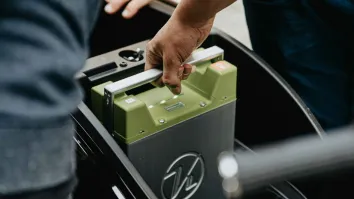
Johor-Singapore ecozone needs stable marketplace for energy credits
This is expected to drive investment in cross-border electricity trade.
The Johor-Singapore Special Economic Zone could attract more than $40m in renewable energy (RE) investments annually, but investors need to be assured that the certificates they get for producing clean power can be traded on an established marketplace and monetised.
Authorities should set up baselines to ensure that these renewable energy certificates (REC) — issued when one megawatt-hour (MWh) of electricity is generated and delivered to the grid from a clean source — would be recognised, Faez Abdul Razak, finance and project partner at law firm Wong & Partners, told Asian Power.
“If the renewable energy certificates follow that minimum standard, no matter who the issuer is, these should be recognised by each country, and that's probably something that is more doable,” he said via Zoom.
Razak expects the ecozone to attract about $40m in RE investments, thanks to interest from companies such as Tenaga Nasional Berhad (TNB), Gentari Sdn. Bhd., Sembcorp Industries Ltd., and Keppel Ltd.
Malaysia and Singapore, which formed the economic zone in January to boost business and economic ties, are looking at setting up a framework to recognise renewable energy certificates associated with cross-border power trade.
The framework is expected to drive electricity trade between the two neighbors, as Singapore tries to meet a third of its energy needs with six gigawatts of low-carbon power imports by 2035.
Companies use renewable energy credits to help them meet their climate goals. They may buy these certificates to offset power consumption from nonrenewable sources, allowing them to claim they’re using carbon-free power.
Critics have noted that when those credits, which have come under heavy scrutiny, are removed from companies’ carbon accounting, many businesses are no longer on track to meet their climate goals.
There is no single framework for the issuance of these energy credits. Policies vary by state in the US, whilst China has its own green electricity certificate system.
Thorbjörn Fors, group senior vice president and managing director for the Asia-Pacific at Siemens Energy, said the ideal framework for the Johor-Singapore ecozone “must deliver credibility, regulatory alignment, and transparency whilst preventing double counting.”
“By integrating strong traceability, digital reporting mechanisms, and scalable solutions, the [ecozone] can build a framework that aligns with international standards and supports corporate sustainability reporting, paving the way for further investment in renewable energy trade across the region,” he said in an emailed reply to questions.
He added that a clear regulatory roadmap, predictable tariff structures, and long-term commitments from buyers would boost investment and foster lasting renewable energy growth in the ecozone.
Razak cited Malaysia's advantage of having vast land for RE plants that can export power to land-constrained Singapore.
Fors said both countries should scale up their renewable energy sources and transmission infrastructure to support the development of the ecozone.
“Strengthening grid infrastructure, diversifying supply sources, and securing long-term procurement contracts for critical grid components will be essential to enhancing resilience and accelerating deployment,” he said.
Singapore’s generation capacity had reached 12,406 megawatts as of June 2024, most of which came from combined cycle gas turbine, cogeneration and tri-generation plants, followed by solar and waste-to-energy plants, according to the Energy Market Authority.
The government is rolling out projects to strengthen its grid infrastructure through technologies such as battery energy storage.
Razak said there should be a policy supporting the cross-border supply of renewable energy, adding that whilst Malaysia does have a policy in place, deals must go through TNB, which is majority-owned by the state and the sole electric utility company in the country.
“Something similar should also be implemented in the Johor Singapore Special Economic Zone, but maybe they would want it to be more of an open market and not go through TNB,” he added.

















 Advertise
Advertise









